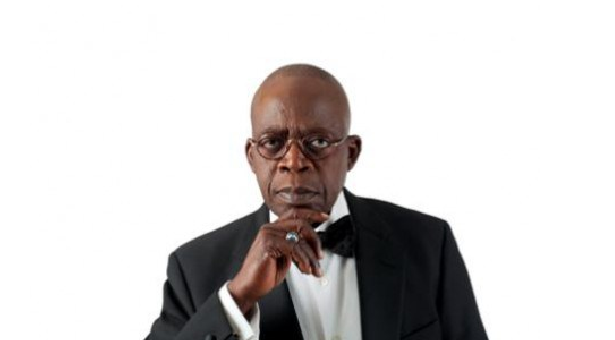This post has already been read 2113 times!
Born into relative obscurity even as apocryphal or doubtful sources claim he was raised or nurtured in sublime circumstances, Ashiwaju Bola Ahmed Tinubu’s early life is controversial or shrouded in convoluted mystery.
Today, however, he may well qualify as the enfant terrible of Nigeria’s political landscape. His name and presence interchangeably provoke or invoke joy and grief, ecstasy and depression, intoxication and stupefaction. Even as very little is known about his growing up years, Tinubu’s avidly disputed birth circumstances are the delight of gossip circuits. Regarding the infinite possibilities of a life that defies theoretical or practical limitations to upwardly-mobile projections, Tinubu is the folklorist or raconteur’s hero. To Tinubu, all things are practically possible; all ambitions are achievable.
Tinubu’s decision to run for the Governorship position of Lagos State in 1999 may well stand as the most fateful judgment of his post-private sector employment career. Brandishing a progressive mien, he positioned socio-political reforms (particularly the vexed issue of the political restructuring of Nigeria) as the most critical domestic issue of the time. He vented his spleen on “reactionary” elements who wanted or insisted on “business as usual.” But the chicanery or expediency of the Tinubu campaign for a re-structured Nigeria was soon to be exposed as subsisting only for a personal, private purpose. The joys of the victory of the APC in the 2015 presidential poll, itself an opportunity for turning around the misfortune of the country’s political quagmire respecting, for instance, the requirement of the practice of true federalism or of a restructured polity, became sour or have been lost on the altar of political shibboleth. Even Tinubu as the titular National Leader of the ruling party has since lost his voice as he now blows muffled horns regarding his party’s political restructuring advocacy. There is concern that Tinubu’s hand may have predictably “lost it’s cunning”. The position, as it has stood over the last six years of the APC presidency, has had a bad moral effect on all those who had expected a turnaround consistent with the published pronouncements of the APC leaders. It has also had a detrimental impact on the community of admirers.
The complexities and contradictions are discernible in Tinubu’s vitality in politics and in social life manifest as the embodiment of his self-projection in the APC of which he is the party’s undeniable alter ego. The observable enthusiasm in the APC rank and file notwithstanding, the party reflects a worrisome dynamism or vitality that is un-dialectical or that is self-denying of theoretical rigour or practical implementation. Policies and programmes appear to have been positioned as mere catch-call contrivances presumably to score cheap debating points or to win undeserved votes.
There is widespread learned critique of APC’s professed philosophy, policies and programmes which has raised a dialectical query. This relates to what is generally perceived as the inadequacy of the party’s thought constructs regarding their formulations even at the point of their conception. What is however not popularly recognised is that the constructs were opportunistically put together just in time to defeat the rascality of the ravaging years of the PDP. But only intense creativity would have produced an enduring socio-political programme that could reverse the years of locusts representing the 16-year misrule of the PDP.
Deep as Tinubu is reputed to be in worldly matters, a critical lack of a profound sense of history is discernible particularly in his quest to drag the South-West geo-political zone into Nigeria’s “mainstream” dining or food ladling table. The characteristic private purpose of such enterprise dogs an advertised altruistic intention and so is generally held in suspicion. Similar failed attempts in the past lend credence to the feared unworkability of an unequal master-servant relationship clairvoyantly identified in the effort. The South-West leadership of the APC had, for instance hoped to reap bountifully from a Buhari presidency by reason of its monumental contribution to the electoral fortunes of the APC in the 2015 presidential poll. It is now curiously learning how not to allow itself to be used as the cat’s paw for fetching the chestnuts from a raging fire.
This season of feverish political campaigns and of sugar-coated promises offers yet another opportunity to dialectically interrogate the objective effectiveness of the plans, programmes and policies of the APC that professedly came to put an end to cluelessness, dithering, impunity, corruption and insurgency with a view to charting a probable new and refreshing course.
The simmering schism in the South-West wing of the party is reminiscent of the crisis that rocked the Action Group in the 1960s. The conflictive positions of President Buhari’s men of South-West extraction and those of Tinubu acolytes bear resemblance to or are, in fact, on all fours with the fundamental disagreement of the Awoists and the “Federalists” led by Chief Ladoke Akintola. In the two situations, “outsiders” have found a convenient in-road into the politics of the zone and are poised to reap profitably from the ensuing internecine feuds. Today, for instance, some of Tinubu’s frontline allies are being seriously touted as possible replacements for his alleged vaulting or overarching ambition or his blitzkrieg one up-manship. Just as the Western Region was never the same again after the battle of the titans of the time, today’s South-West will be flustered by the sabre rattling of her more ideological “captors” and the rascality of burgeoning quislings. Pitifully, the battle will be pre-occupied with the material enrichment of the erstwhile Tinubu acolytes on the one hand and the fortification of the hegemony of the invading “outsiders” on the other. The situation, unfortunately, portends a near-infinite postponement of the people’s ordained place.
Those who have ears to hear, let them re-learn the lessons of history.
Rotimi-John, a lawyer and public affairs commentator wrote from Lagos.



